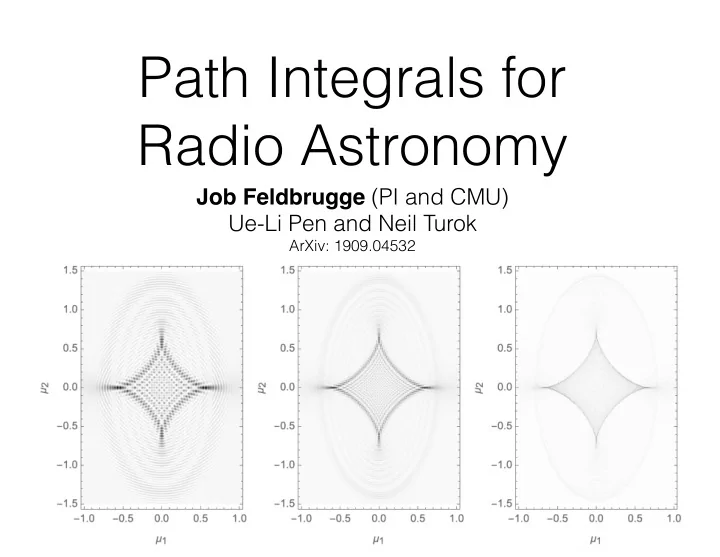

Path Integrals for Radio Astronomy Job Feldbrugge (PI and CMU) Ue-Li Pen and Neil Turok ArXiv: 1909.04532
Interference • Interference is a universal phenomenon in physics. In radio astronomy, the scintillation of pulsars and potentially Fast Radio Bursts • However, multi-dimensional oscillatory integrals are expensive to evaluate numerically • We present a new integration scheme, based on Cauchy’s integration theorem and Picard-Lefschetz theory • The algorithm runs in polynomial time, and becomes more efficient as the integrand becomes more oscillatory
Fresnel Integral • From the path integral to the Fresnel integral Z x (1)= x obs ω 2 � ( x ⊥− µ )2 p ( x ⊥ ,z ) R Z i ω − d z D x e iS [ x ] = 2 c ω 2 d d x ⊥ e x (0)= x s p = n e ( x ) e 2 d = 1 1 + 1 ! 2 d sl d lo ✏ 0 m e • In dimensionless units: ⌘ D/ 2 Z ⇣ ν d D x e i ν [ ( x − µ ) 2 + φ ( x ) ] Ψ ( µ, ν ) = π • A multi-dimensional oscillatory integral with the imaginary exponent ( x − µ ) 2 + φ ( x ) ⇥ ⇤ Φ ( x ) = i ν
Geometric Optics • Multi-image regions separated by caustics, where intensity spikes • In geometric optics, the integral is approximated with the real saddle points of the exponent Φ ( x ) • In wave optics, we need to evaluate the integral. Nontrivial behaviour near caustics
Catastrophe theory [Arnol’d 1973, 1975, Berry and Upstill 1980, many others]
Picard-Lefschetz Theory • Picard-Lefschetz theory: any K σ meromorphic oscillatory integral J σ Z R D d D x e if ( x ; µ ) I = σ J σ • can be expressed as a sum of convex integrals K σ if ( x ; µ ) = h ( x ; µ ) + iH ( x ; µ ) Z X d D x e if ( x ; µ ) I = n i J i i • with the intersection numbers n i = h R D , K i i
• The Fresnel integral Z d x e ix 2 R • can be written as a Gaussian integral by a deformation in the complex plane 1 + i Z d u e − u 2 √ 2 R
• Consider the lens α φ ( x ) = 1 + x 2 • Alternatively we can flow the integration domain Φ ( x, µ ) = h ( x, µ ) + iH ( x, µ ) ∂γ λ ( x 0 ) = �r h ( γ λ ( x 0 )) ∂λ γ 0 ( x 0 ) = x 0 X λ →∞ γ λ ( R N ) = J = lim n i J i i
The Cusp
The Swallowtail
Localized lenses α Z R 2 e i ν [ ( x − µ ) 2 − φ ( x ) ]d x φ ( x ) = Ψ ( µ ) = 1 + x 2 1 + 2 x 2 2
• Two dimensional lens consisting of a blob Z R 2 e i ν [ ( x − µ ) 2 − φ ( x ) ]d x Ψ ( µ ) = α φ ( x ) = 1 + x 2 1 + 2 x 2 2 • Caustics: • Folds • Cusps • Hyperbolic
• Complicated lens Z R 2 e i ν [ ( x − µ ) 2 − φ ( x ) ]d x Ψ ( µ ) = α φ ( x ) = 1 + x 4 1 + x 2 2 • Caustics: • Folds • Cusps • Hyperbolic
• Complicated lens Z R 2 e i ν [ ( x − µ ) 2 − φ ( x ) ]d x Ψ ( µ ) = φ ( x ) = α ( x 3 1 − 3 x 1 x 2 2 ) 1 + x 2 1 + x 2 2 • Caustics: • Folds • Cusps • Elliptic
Summary • Picard-Lefschetz theory: a new method to evaluate multi-dimensional oscillatory integrals • A useful tool in wave optics, especially near caustics • Gravitational microlensing by Dylan Jow. • Can we detect caustics in scintillation measurements, how much amplifications? [Main et al. 2018] • Given an interference pattern, can we reconstruct the lens?
Catastrophe theory [Arnol’d 1973, 1975, Berry and Upstill 1980, many others]
Catastrophe theory
Recommend
More recommend